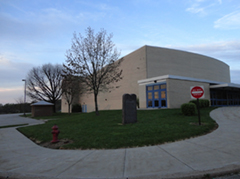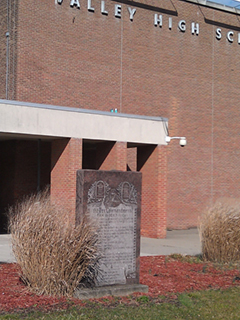The Freedom From Religion Foundation has sent demand letters to two Pennsylvania school districts, warning that if FFRF did not receive word by Friday, Sept. 7 that the districts were removing illegal Ten Commandment markers on school property, it and local plaintiffs will sue in federal court.


Connellsville violation. New Kensington violation. (photo): Stephen Hirtle.
FFRF has hired counsel and has parent plaintiffs in both school districts. Marcus B. Schneider of Pittsburgh wrote both districts on Aug. 29 on behalf of FFRF, noting that these Ten Commandment monuments “will not withstand judicial scrutiny.” Read letter to New Kensington School District. Read letter to Connellsville Area School District.
In response, the Connellsville Area School District quickly contacted Schneider, agreeing to remove the six-foot-tall, tombstone-like Eagles Ten Commandments located near the Junior High School East entrance by the auditorium. By Friday, Sept. 7, the district had placed plywood over the front of the monument (although vandals apparently removed the plywood over the weekend). The district assured Schneider it would arrange to remove the biblical marker as soon as possible.
However, FFRF has received no such assurances from New Kensington-Arnold School District, which FFRF first contacted last March. The six-foot granite monument prominently displayed at Valley High School is visible by the school entrance, sitting between two footpath bridges leading from the parking lot to the main entrance of the school.
“The permanent display of the Ten Commandments in front of a New Kensington-Arnold school violates the Establishment Clause of the First Amendment. Courts have continually held that public schools may not display religious messages or iconography,” wrote FFRF Staff Attorney Patrick Elliott. He further cited the Supreme Court decision that ruled posting the Ten Commandments in schools violates the Establishment Clause:
The pre-eminent purpose for posting the Ten Commandments on schoolroom walls is plainly religious in nature…The Commandments do not confine themselves to arguably secular matters…rather, the first part of the Commandments concerns the religious duties of believers: worshipping the Lord God alone, avoiding idolatry, not using the Lord’s name in vain, and observing the Sabbath Day. Stone v. Graham, 449 U.S. 39, 41 (1980)
Because the New Kensington marker is a Roman Catholic version of the Ten Commandments (due to numbering and the missing commandment against ‘graven images’), it not only promotes religion over nonreligion, but Catholicism over other forms of Christianity, Elliott pointed out.
Justice Breyer has noted that Ten Commandment displays have no place “on the grounds of a public school, where, given the impressionability of the young, government must exercise particular care in separating church and state.”
“The New Kensington school district deserves an ‘F’ for its irresponsible dereliction of its duty to protect the freedom of conscience of its captive audience of students,” commented FFRF Co-President Annie Laurie Gaylor. "It should not be necessary for parents and FFRF to sue over such an egregious violation, to waste our money and taxpayer funds when the outcome is foregone — the Ten Commandments monument must go from Valley High School.”
“The First Commandment alone shows why the government may not post or endorse the Ten Commandments. A school district has no business telling students and their parents which god to have, how many gods to have or whether to have any gods at all! In the United States, individuals may believe or disbelieve as they like, but the government and our public schools may not take sides on matters left to personal conscience.”
FFRF has more than 18,500 nonreligious members nationwide, including almost 700 in Pennsylvania. Acting as a state/church watchdog, it has brought over 60 laws since being founded in 1978. Currently, it is suing on behalf of its members, including 41 named state members, and its chapter, Nittany Freethought, challenging the declaration by the Pennsylvania House that 2012 is “The Year of the Bible.” In July, seven months after it first protested a city nativity scene owned and placed by Ellwood City Borough Council (Pa.), the council voted finally not to put up the devotional display in the future.